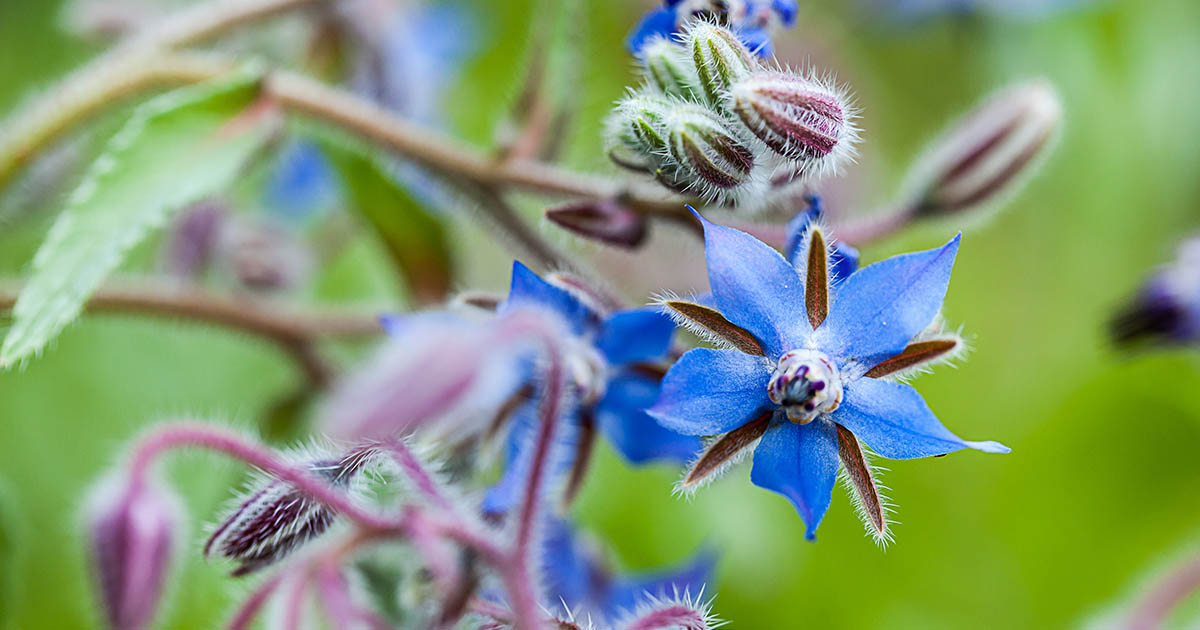
Are you ready to unravel the incredible world of borage? Prepare to be amazed as we dive into the realm of this fascinating plant and discover 15 mind-blowing facts that will leave you in awe. Borage, also known as starflower, is a stunning herb that not only adds beauty to gardens but also possesses numerous health benefits. From its vibrant blue flowers to its nutritious leaves, borage has captivated the attention of plant enthusiasts for centuries. In this article, we will explore the historical significance, medicinal properties, and culinary uses of borage. So sit back, relax, and get ready to be blown away by these astounding facts about borage!
Key Takeaways:
- Borage is a versatile plant with edible leaves, beautiful flowers, and medicinal properties. It attracts beneficial insects and has a long flowering season, making it a delightful addition to any garden.
- Borage oil is prized in skincare for its moisturizing properties, and the plant has a rich history of medicinal use. It’s easy to grow, self-sows, and has been used as a natural dye, making it a fascinating and valuable addition to any garden.
Borage is a star-shaped beauty.
Borage, scientifically known as Borago officinalis, is a stunning plant that graces gardens with its vibrant blue star-shaped flowers, adding a touch of elegance to any landscape.
It is also known as a “bee plant”.
Borage is often referred to as a “bee plant” because its flowers attract bees with their abundant nectar, making it a favorite among beekeepers and gardeners alike.
The leaves are edible.
Borage leaves have a subtle cucumber-like flavor and are commonly used in salads, teas, and even cocktails. They add a refreshing taste and are rich in nutrients.
Borage is rich in gamma-linolenic acid (GLA).
One of the unique attributes of borage is its high concentration of GLA, an essential fatty acid that offers numerous health benefits, including reducing inflammation and promoting skin health.
It has a long history of medicinal use.
Borage has been cultivated for centuries and is renowned for its medicinal properties. It has been used to alleviate various ailments, including respiratory issues, inflammation, and even depression.
Borage flowers are used as garnishes.
The vibrant blue flowers of borage make for stunning garnishes in culinary creations. They add a pop of color and can be used to decorate salads, desserts, and even beverages.
It has a cooling effect.
Borage is known for its cooling properties, making it a popular ingredient in herbal remedies designed to soothe fevers and calm irritated skin.
Borage is easy to grow.
Whether you have a green thumb or not, growing borage is a breeze. It is a resilient plant that thrives in various climates and soil types, making it an ideal choice for both beginner and experienced gardeners.
It attracts beneficial insects.
Besides bees, borage also attracts other beneficial insects such as butterflies, hummingbirds, and ladybugs, which help to pollinate plants and keep harmful pests at bay.
Borage has a long flowering season.
Once borage begins to bloom, its flowers delight the eyes for an extended period. With proper care, this enchanting plant can continue to produce flowers from early summer all the way through to the first frost.
It is used in traditional herbal medicine.
Borage has been an essential ingredient in traditional herbal medicine systems around the world. It is believed to have numerous health benefits, including promoting healthy digestion, reducing stress, and improving heart health.
Borage oil is prized in skincare.
Extracted from the seeds of the plant, borage oil is highly valued in the cosmetic industry for its moisturizing and rejuvenating properties. It is often used in skincare products to nourish and hydrate the skin.
Borage can self-sow.
Once you have borage in your garden, chances are it will readily self-sow, meaning it will drop seeds and sprout new plants without much effort on your part. This self-sowing characteristic makes it a low-maintenance addition to any garden.
It has been used as a natural dye.
Borage flowers have historically been used to create a natural dye that produces hues ranging from blues and purples to pinks and greens. This has made borage a popular choice for textile artists and crafters.
Borage is believed to bring courage.
In folklore and ancient traditions, borage was associated with courage and bravery. It was often given to courage-seeking knights before they went into battle, symbolizing fearlessness and protection.
Conclusion
In conclusion, borage is a fascinating plant with numerous mind-blowing facts. From its stunning blue star-shaped flowers to its myriad of uses in culinary and medicinal applications, borage has captured the attention of plant enthusiasts and experts alike. Its rich history, versatile nature, and exceptional health benefits make it a valuable addition to any garden or kitchen.Whether you decide to grow borage for its beautiful blooms or for its therapeutic properties, this plant is sure to impress. So go ahead and explore the wonderful world of borage, and witness its magic firsthand. Happy gardening!
FAQs
Q: Can borage be used in cooking?
A: Absolutely! Borage leaves and flowers are commonly used in salads, soups, and teas. The leaves have a refreshing cucumber-like flavor, while the flowers add a pop of color and a hint of sweetness to dishes.
Q: Is borage easy to grow?
A: Yes, borage is relatively easy to grow. It is a hardy annual plant that thrives in full sun and well-draining soil. It self-seeds easily, meaning it will come back year after year without much effort from the gardener.
Q: Are there any health benefits to consuming borage?
A: Indeed, borage is known for its health benefits. It is rich in gamma-linolenic acid (GLA), an omega-6 fatty acid that has anti-inflammatory properties. Consuming borage can help promote skin health, reduce inflammation, and support overall well-being.
Q: Can borage attract beneficial insects to the garden?
A: Yes, borage is a magnet for beneficial insects such as bees and butterflies. Its vibrant blue flowers and sweet nectar attract pollinators, making it a valuable addition to any pollinator-friendly garden.
Q: Are there any precautions to consider when using borage medicinally?
A: While borage is generally safe for most people, it is important to consult with a healthcare professional before using it medicinally. Some individuals may experience allergic reactions, and excessive consumption of borage seeds or oil should be avoided.
Borage's star-shaped beauty and medicinal properties make this versatile plant truly fascinating. From its edible leaves rich in gamma-linolenic acid to its long history of traditional herbal use, borage continues to astound with its myriad benefits. Gardeners appreciate borage's easy-to-grow nature and its ability to attract beneficial insects, while culinary enthusiasts enjoy using the vibrant flowers as garnishes. Beyond these mind-blowing facts, there's even more to explore about this remarkable plant. Uncover additional astounding facts about borage, delve into the extraordinary world of starflower, and embark on a captivating journey through the realm of herbal wonders.
Was this page helpful?
Our commitment to delivering trustworthy and engaging content is at the heart of what we do. Each fact on our site is contributed by real users like you, bringing a wealth of diverse insights and information. To ensure the highest standards of accuracy and reliability, our dedicated editors meticulously review each submission. This process guarantees that the facts we share are not only fascinating but also credible. Trust in our commitment to quality and authenticity as you explore and learn with us.


